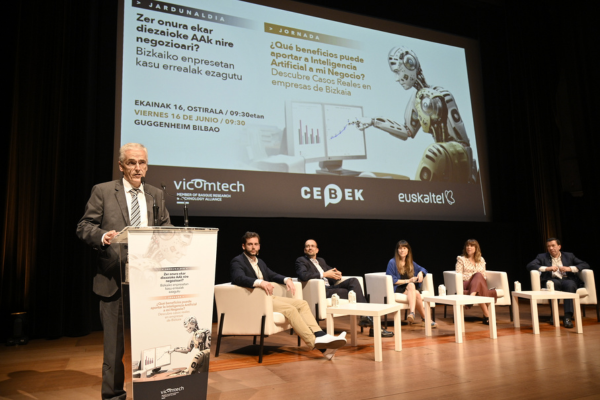The workshop "What benefits can Artificial Intelligence bring to my Business?" brings together a hundred companies from Bizkaia at the Guggenheim Museum
Organized by Vicomtech, EUSKALTEL and CEBEK, it offered different approaches to the integration of artificial intelligence systems in companies. Dibal and Petronor presented different practical cases applied to their sectors.

20.06.2023
The session, addressed to managers, directors and middle managers of companies it was eminently practical. Through presentations and real cases, the characteristics of AI projects were transferred and specifically, the value of data and the wide possibilities of technology transfer were highlighted.
After the presentations by Carolina Pérez Toledo (President of CEBEK) and Jon Ander de las Fuentes (General Director of Euskaltel) the presentations began.
Euskaltel and the value of Data
Adrian Bertol, IA Sales Specialist at Euskaltel, spoke about the importance of having a well-established data strategy in the company.
Traditionally, the analytics that were carried out on the data were descriptive, carried out through dashboards and Business Intelligence tools. With Artificial Intelligence models, they are increasingly oriented towards predictive and prescriptive analytics.
In this context, to define the data strategy, we must begin by considering the state of maturity of each company. For example, “what data do I have? How accessible are they? What databases am I using? And one of the problems that raises the most is the dimension of Human Resources: Do I have analysts or data scientists?
From there, you can start to define your custom AI roadmap.
The use cases in which AI can be used cover a wide range, from production optimization, stock management, demand forecasting or prediction of results.
They are flexible and adapted applications due to the different characteristics and needs that each company presents.
Vicomtech, buy or develop AI?
Gorka Marcos, Director of Technology Transfer at Vicomtech, analyzed the main keys for the transfer and application of AI in companies.
In his presentation, he stressed the need to adopt new approaches to the competencies of the workers, the business culture and the organizational structure.
The starting point, and one of the fundamental elements when tackling an AI project, is knowing when it is better to buy AI and when it is better to develop it.
In any case, the keys to building an efficient AI go through identifying the problem; collect and clean data; select machine learning model; train the model; integrate AI into the business model; and evaluate and improve the model. To guarantee the success of the project and the implementation, it is necessary to have partners with proven experience and know-how in the matter.
Dibal: smart scales for commerce
The Managing Director at Dibal, Juan Román Nava, exposed the benefits of AI for the business from his practical experience, after his collaboration with Vicomtech.
Dibal trade scales have a market share of over 50% in Spain (65% if we are talking about Large Distribution). Its success lies in its precision and success rate close to 100%; at your ease, simplifying the purchase process; in speed, avoiding queues; in its image of modernity; and in security, avoiding fraud and losses.
Beyond the current artificial vision, Vicomtech has developed a solution with great potential that, for example, will help the seller in environments with high staff turnover and a wide assortment of products, will allow the quality of the packaging to be verified or incorporate chats to guide the seller in customer service.
Petronor: the success of "virtual measurements"
The other case study of the day was reported by Itziar Landa, Head of Digitalization at Petronor.
In his presentation, he explained that a few years ago the need arose for a decision support solution through the real-time generation of useful information on the generation processes. That is where Softensors was born, a pioneering project to introduce AI in the industry, carried out with Vicomtech, in the form of a tool with technology that is transparent to the end user.
It is a "virtual meter" capable of measuring a property without the need for any physical instrument. In order to perform the measurements, it reads all the influencing variables of the process and provides a prediction of the desired parameter.
It is, therefore, algorithmic models that are trained or configured with use case data.
There are many advantages associated with SoftSensors: they learn from a large volume of variables; they extract complex correlations and define the most influential variables. They also allow variables to be monitored online that until now could not be.
Discussion Panel
The day ended with a Roundtable Discussion, moderated by Laura Marrón (BAIC General Director), in which the opportunities and challenges in the use of AI, the value of data, technology transfer capabilities and the need for specialized profiles in companies were analysed.
The event was closed by Julián Florez, General Director of Vicomtech.







